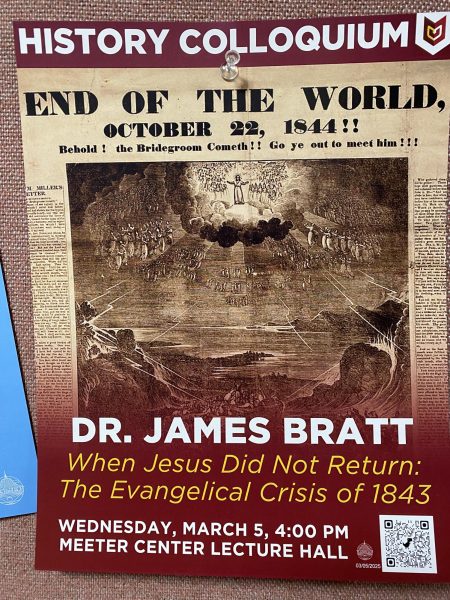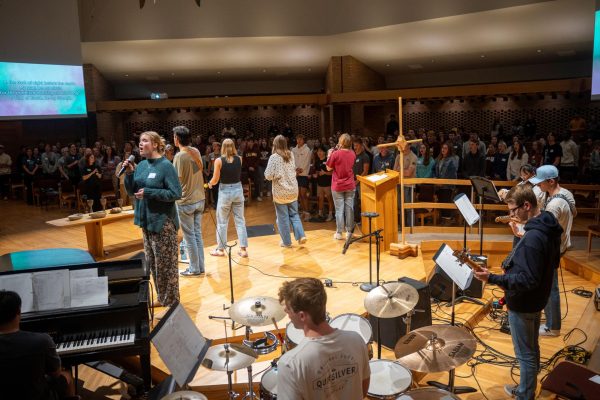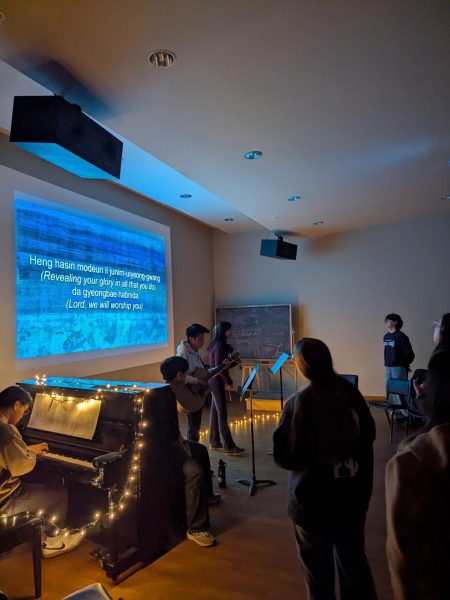Interfaith lab promotes dialogue between traditions
Students from several West Michigan colleges and universities, including Calvin, Hope and Grand Valley State University (GVSU), participated in the Made in Michigan Interfaith Lab last weekend. Organized and hosted by GVSU’s Kaufman Interfaith Institute, the event took place at multiple locations throughout West Michigan, including the GVSU campus and multiple houses of worship.
The conference opened with a visit to Temple Emanuel, a Reform synagogue located in Grand Rapids. Students joined congregants for their Shabbat service, a time of singing, prayer and teaching from the Torah. After a blessing over wine and bread, many students stayed to converse with the synagogue members.
“It was wonderful to get out of the Calvin bubble and be both challenged and blessed by a new kind of worship,” said senior Chloe Selles. “I came away feeling more aware of our similarities than our differences.”
The conference continued on Saturday with interfaith training, hosted at GVSU’s DeVos Center. In the afternoon, Kyle Kooyers, program manager for the Kaufman Interfaith Institute, moderated a panel discussion on violence, extremism and hatred in religious traditions. Each panelist spoke from individual experience, not as a definitive representative of their tradition, Kooyers reminded attendees.
The discussion opened with brief statements on the traditions’ key values from the participants: Dominican sister Mary Brigid Clingman, Muslim Dr. Eyas Albeiruti, secular humanist Roger Brewin, and Sikh Samrath Singh. Kooyers then asked the panelists to consider common misconceptions about their tradition.
Clingman criticized the perception of the Catholic church as “static,” citing the church’s more compassionate response to suicide in recent years.
“Institutions may be very slow to learn,” she said, “but they can learn.”
Brewin, a former Unitarian Universalist minister and a current member of Grand Rapids’ Center for Inquiry, reminded attendees that atheism and humanism are not one and the same. While atheism simply denies the existence of a god, humanism centers upon human reason, community and compassion.
When asked to address common misconceptions about Islam, Albeiruti said, “I don’t know where to start.” He challenged the stereotype of Muslims as terrorists and totalitarians, referencing the Quran’s teachings on mercy.
“This image that people have is not reality,” he said. “You’ve got to dig deeper.”
Singh also warned his listeners against visual assumptions: a man in a turban is often a Sikh, not a Muslim. This misguided fear and anger can result in tragedy, including the first reported hate crime after 9/11: the death of Balbir Singh Sodi, a Sikh-American gas station owner.
Violence can also happen after power shifts, as Clingman referenced within Christian history:
“We’ve gone through 2,000 years of killing each other… we haven’t quite learned how to stop being victims.”
Within his own humanist context, Brewin often confronts those who lash out at a certain religious tradition after leaving it.
“When you’re too young or too emotional to think, that’s when tensions arise,” he said.
The panelists then offered strategies for breaking the cycle of “hurting people hurt people.” Each emphasized the importance of reaching out to others in the community, not just remaining within assumptions. Even just asking questions, the panelists said, could diminish the possibility for violence, extremism and hatred.
The interfaith lab concluded on Sunday with visits to three local houses of worship. St. Nicholas Antiochian Church welcomed the group to a portion of its Sunday service, the Divine Liturgy.
At the Sikh Society of West Michigan with panelist Samrath Singh, attendees joined members for a “delicious” Indian breakfast, in the words of senior Anna Selles. The group then watched a musical meditation on the Guru Granth Sahib, the central Sikh scripture. Attendees then learned about the Hindu deities from Frank Stella, the pracharak (outreach minister) at the West Michigan Hindu Temple, and enjoyed, as Selles said, “more Indian food” for lunch.
Selles, the interfaith intern with Calvin’s Service-Learning Center, expressed her gratitude for her hosts’ “hospitality” and lessons throughout the weekend. Some spaces, like the Orthodox church and the Jewish synagogue, reminded her of previous experiences, while others — the Hindu temple and Sikh Gurdwara — felt “quite foreign.” Despite these differences, Selles appreciated the opportunity to connect with a variety of traditions.
“Each tradition emphasizes a belief I’ve been taught — to love and serve your neighbor,” she said. “Interfaith encourages us to learn about the values we share and how to cooperate across religious lines for the good of each other.”
Those interested in participating in future interfaith events may follow the Calvin Interfaith Opportunities page on Facebook.






